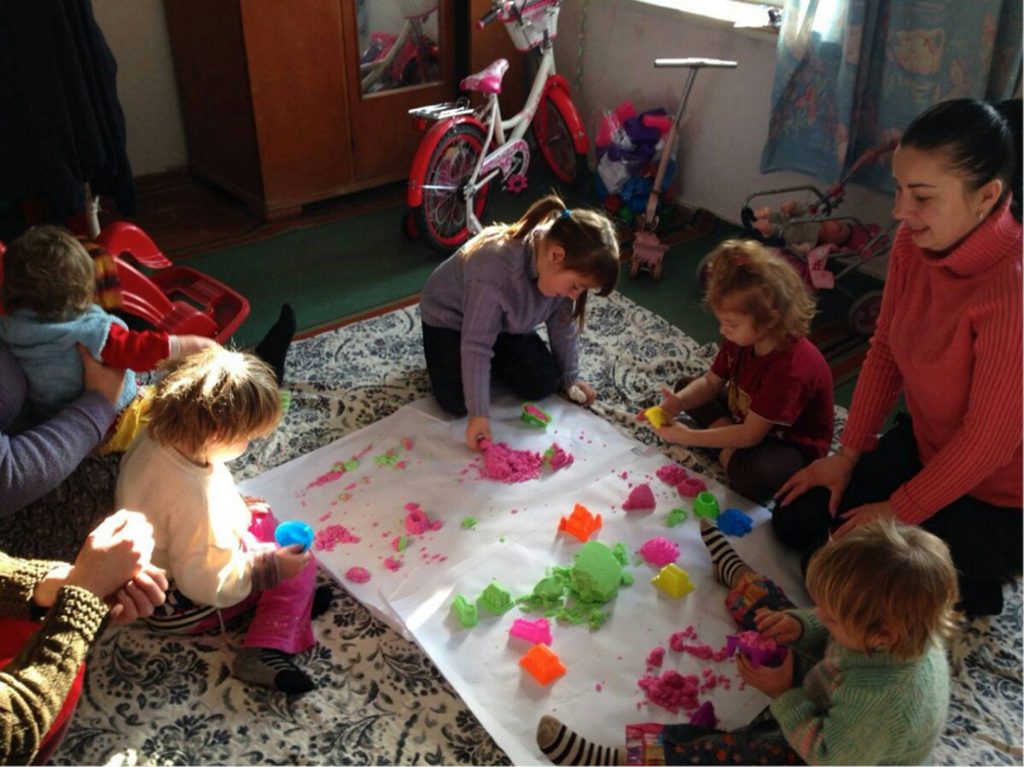As the conflict in Eastern Ukraine continues, many have fled the buffer zone to face an uncertain future, while others have stayed behind and struggle with every day needs. Limited access to basic life-saving services, depleted livelihoods, and exhausted coping strategies due to protracted nature of the conflict continue destroying social and family fabrics of the local communities. This is especially affecting young mothers such as Rosa* and her three children who have been living under difficult conditions as jobs and supplies in conflict affected areas are hard to come by. Rosa also noted how her children were falling behind on important developmental milestones, her one-year-old still had not started speaking.
International Medical Corps has been able to help conflict affected populations and mothers such as Rosa by implementing the “Emergency Protection and Winterization Support for Conflict-Affected Populations in Eastern Ukraine” project which is funded by the Office of U.S. Foreign Disaster Assistance (OFDA) since 2016. As part of this project, psychologists and case workers of the Mobile Protection Teams (MPT) have provided psycho-social support and child protection assistance to seventeen vulnerable communities residing in the buffer zone of Donetsk region. They have been organizing “Young Mothers’ Club” activities over 16 weeks in one of the settlements of Donetsk region. Those activities effectively combined provision of helpful parenting strategies, reinforcement of mothers’ sense of personal safety and well-being, and early childhood development activities with their children.
Rosa* joined the “Young Mothers’ Club” in the hope of improving relationships with her three pre-school-aged children, increasing awareness of the hygiene and sanitation essentials, and promoting essential early development of her children.
“Before the program I had difficulties in raising my children. I shouted at them, displayed aggression, did not pay enough attention to them, and also was not dealing with their cognitive development, hygiene, and health, Rosa said.”
Her 3-year-old daughter struggled to meet important early development milestones including social, emotional, and physical ones. Her 1-year-old daughter did not pronounce any sound at that point time, did not crawl and did not stand on her feet. Rosa’s 7-year-old daughter, who spends five days per week in a boarding school, had very low school performance, low self-esteem and self-confidence, according to Rosa. Rosa herself, resides in her parents’ home which is only partially equipped, without proper sanitary conditions and bathroom facilities. Rosa was experiencing multiple life challenges which were greatly exacerbated by the devastating impact of the conflict and disrupted local communal systems of support.
Rosa said she struggled to provide for her family and meet basic needs: “There is no work in the village–the farm where I worked earlier, is closed now.”
She relies on cash assistance but says is not enough to meet even the most basic needs. In her village there is no water supply and residents receive less than 5 liters each day. Rosa spoke of the dire circumstances and how she attempted to provide for her family, stating, “this winter because of bad weather conditions and because of the lack of opportunity to go for firewood to the forest, I dismantled the wooden toilet so my children would not freeze.”
Catering to the needs of the village, International Medical Corps’ Mobile Protection Team (MPT) implemented activities around health and hygiene with limited resources, how to engage their children in activities that will support their social, emotional and physical growth, and how to plan for the future. The groups also served to increase the young mother’s network of social support. Case Management supported Rosa with referrals to (I)NGOs that were able to provide material assistance, for health and hygiene, basic housing supplies and needs, and weather appropriate clothing for her children.
Rosa reported that, before the program began, “I felt anxiety, confusion, hopelessness and fear of the future.”
According to observations of a Mobile Protection Team psychologist, the 16-week Young Mothers Club activities helped Rosa improve relationships with her children, while her children started showcasing gradual cognitive development and achieving certain milestones.
After the program, Rosa said that she learned to “hear and understand my children, to have a constructive dialogue with them, to resolve conflicts, to be close and cooperate, to grow and develop together, to maintain and improve relations in the family.”
An improvement in the sense of Rosa’s well-being was also confirmed by the post-test results at the closure of the MPT’s programming. Her sense of psychological well-being improved by 20%. Preparing for the International Medical Corps’ eventual departure from the settlement, Rosa and other beneficiaries of the “Young Mothers’ Club,” have already developed a plan for their thematic community gatherings to ensure continuity and durability of the local peer-to-peer support.
*Name and other identifying information changed to protect privacy.
